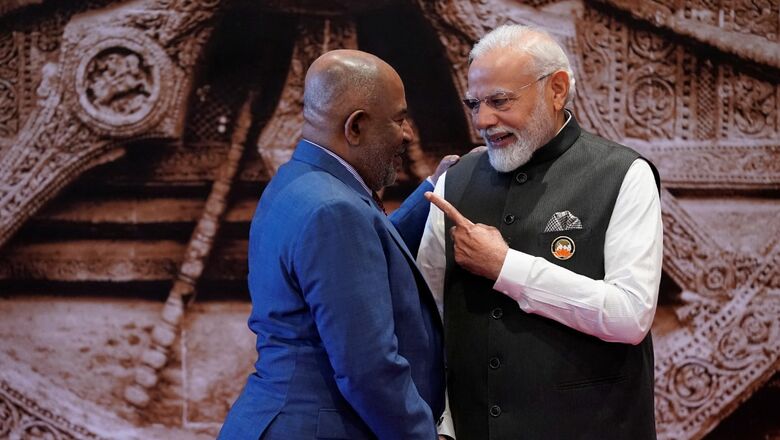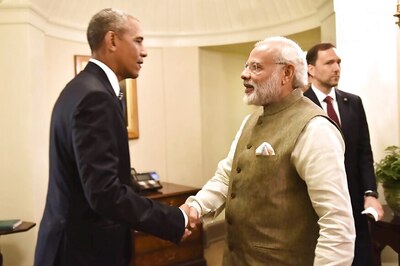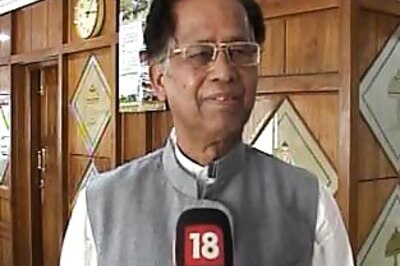
views
“Every morning in Africa, a gazelle wakes up, it knows it must outrun the fastest lion or it will be killed. Every morning in Africa, a lion wakes up. It knows it must run faster than the slowest gazelle, or it will starve. It doesn’t matter whether you’re a lion or a gazelle — when the sun comes up, you’d better be running.”
Most endeavours in the world are driven by the troika of ideology, technology and methodology. African Union (AU), with a collective grouping of 55 African countries, being admitted as a permanent member of the powerful G20 alliance at the spectacular and meaningful summit in New Delhi can be lauded as the biggest victory of India’s G20 presidency. Furthermore, this development will always be heralded as a landmark of inclusivity and counterbalance. This is the very intersection of East-West cultural metrics and North-South sensibilities.
This is a watershed moment as it not only envisages more voice to the Global South but also makes a pivotal statement of a proactive engagement with a continent of 1.4 billion people. It reiterates, in a subtle manner, that if the European Union (EU) is a permanent member of the G20 grouping with 27 member states, the AU with 55 member states with only South Africa as part of the grouping, ought to be a part of the future geopolitical and geo-economics landscape.
In the overall perspective, besides myriad sociometric challenges of health, nutrition, education, poverty as well as economic parameters of high inflation, weak currencies and instability of some states/regimes, Africa is a continent with tremendous potential. It is a big repository of minerals and natural resources with large swathes of land, untouched by chemicals and fertilisers which can make it the food security continent of the globe. There is a large potential for infrastructure and telecommunication development with as many as 16 countries which are landlocked with no access to ports. This is juxtaposed with Chinese debt traps and public debt issues with various nations which require global intervention for growth, progress and inclusivity.
It is important to note that the demographics of the African continent will be of a critical advantage with its rapidly expanding population and the youngest profile of the population among all continents. It does have a huge deficit in terms of its long-term energy needs and there is a viable potential to harness green and renewable energy which can facilitate economic transformation and integration with global value chains.
In the Indian context, bilateral trade with Africa has substantially grown to a significant $98 billion in FY 2022-23. The rate of growth has been at nearly 9.6 per cent, statistically. As many as 27 Low Developed Countries (LDCs) from the continent benefit from Duty Free Tariff Preference (DFTP) on a non-reciprocal basis, with pathbreaking initiatives like the signing of the Comprehensive Economic Cooperation and Partnership Agreement (CECPA) with Mauritius in April 2021 and more Free Trade Agreements (FTAs) in the offing. Indian assistance to nearly 42 countries in the continent with Covid vaccines is also an important waypoint in the relationship.
India has a large diaspora in Africa, with established and globally known business houses in telecom, banking, oil and gas, pharma, infrastructure and retail sectors. The present scenario also makes an astute business case for the adoption of robust Indian Digital Public Infrastructure (DPI), which has the potential to transform businesses, energise governance and deliver essential services, besides fostering innovation, enabling interconnected market access and establishing networks in various domains of technology, healthcare, microfinance etc. There are large opportunities which present themselves in the space of education, public goods and services as well. There are large avenues of security partnerships which can be harnessed with a significant number of Indian military training teams in the continent since long, as well as a strong exposure of the Indian military in the UN peacekeeping and peace enforcing missions.
Integration of AU comes at a time of flagging global economy, seemingly fraught relations between some G20 countries, a raging conflict in the West, a clear and present danger in the East, debt restructuring requirements, climate change and widening disparities in the post-pandemic world. The inclusion of the AU also coincides with India’s rise in political, economic and military stature as well as its befitting candidature for the restructured Security Council in the United Nations.
AU will be a significant entity in the G20, especially with China as a permanent member and global reforms as the central theme for most governments and nation-states. This significant inclusion will be a part of a shared outlook and common goals with India, essentially due to historical and cultural aspects, besides proximity and counterbalancing of Chinese interests in the region. While the G20 grouping consists of around 85 per cent of the global GDP, 75 per cent of the world’s trade and two-thirds of the population, the inclusion of AU will be a game changer. This will open new vistas for Indian businesses, technology infusion, skilling opportunities and more importantly, viewing Africa as a viable business destination.
The author is the Vice President of India Electronics and Semiconductors Association (IESA). Views expressed in the above piece are personal and solely that of the author. They do not necessarily reflect News18’s views.



















Comments
0 comment